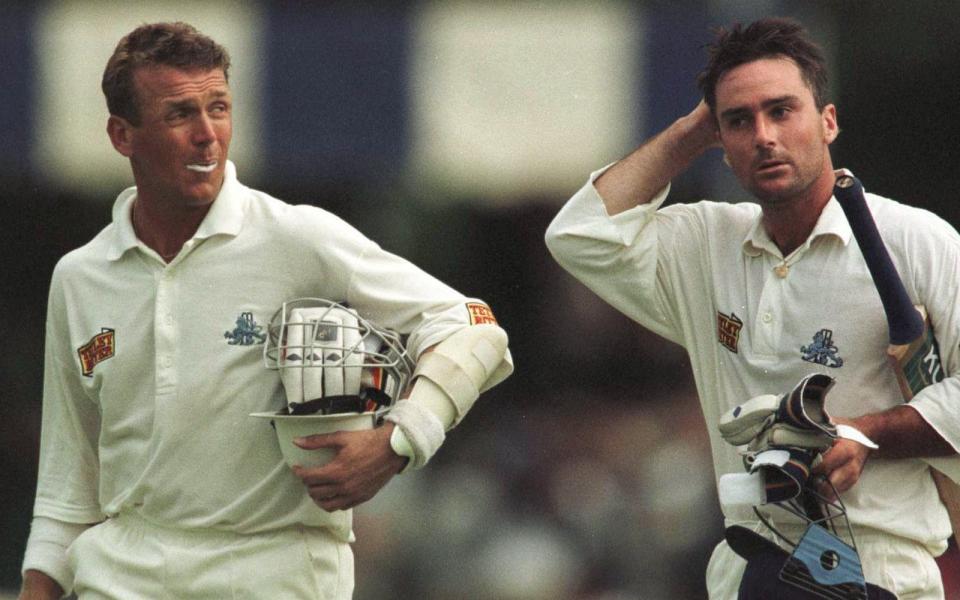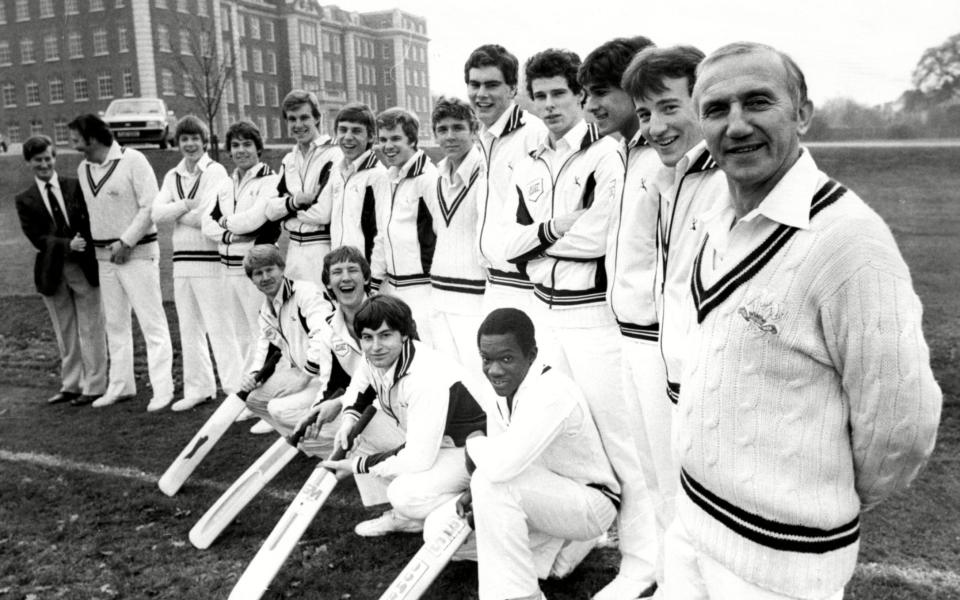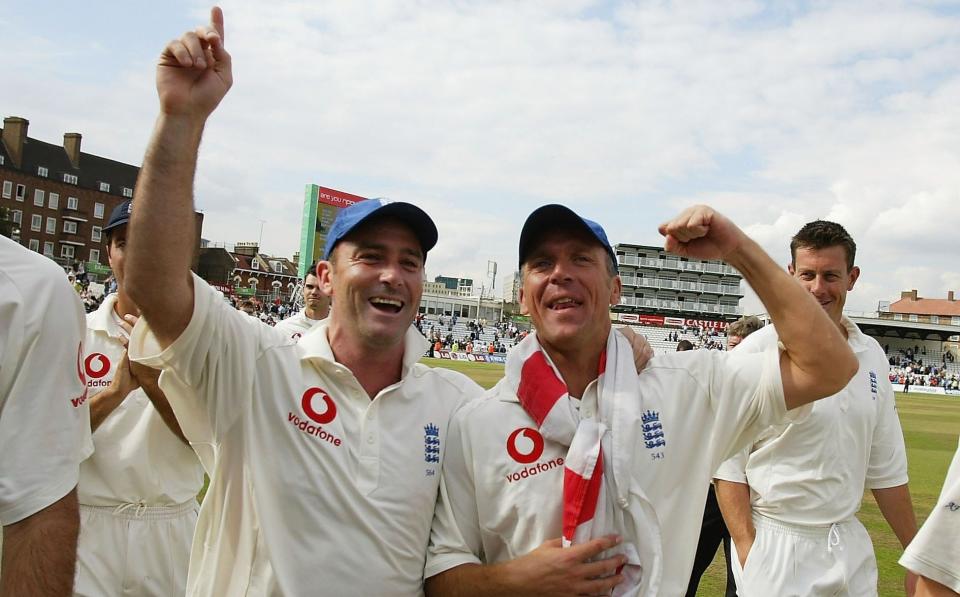Alec Stewart: We did everything we could for Thorpey, but it was never going to be enough

The Stewarts and Surrey have been entwined for decades and so it is only appropriate that putting family first is the reason Alec is standing down as director of cricket after winning three championship titles in a row.
Stewart is negotiating a new position with the club, working about 40 days a year, but his full-time involvement with Surrey is over because his role now is to look after wife Lynn, who has secondary breast cancer and has been fighting the disease for 12 years.
“There are bits and pieces that have crept up recently. It’s never going away. It’s managing it,” he says. “That is, there are some goodish times, and then the last four weeks have been tough for her. And then it’s just putting faith in the oncologist we’ve had from day one, who’s been brilliant. But yes, now I’ve got housework duties, cooking duties and other duties on the agenda which I do to the best of my ability, which isn’t great, but you’ve got to try, haven’t you?
“It is two weeks on and two weeks off with chemo and the oncologist has said we will attack it with vigour. And hopefully make life more pleasant. So it’s just managing it really, dealing with it, which is what we’ve always done. She’s the brave one.”

Lynn’s treatment is why Stewart announced in March that this summer would be his last in charge after 11 years, a period in which the club has come to dominate the championship, winning four times since 2018 and this summer performing the first hat-trick of titles since 1968.
During a wide ranging chat, the suicide of former team-mate and friend Graham Thorpe, is clearly still raw. “I’m struggling to put it into words, but it’s just very, very sad.” He calls on the England and Wales Cricket Board to stop treating counties as “second-class citizens”. There is glowing praise for Dan Worrall, the Australian seamer who qualifies to play for England in time for the Ashes next year, describing him as the best bowler in the country right now and the closest in terms of skill to James Anderson.
He also gives a personal perspective on the father-son relationship in cricket. Stewart’s first memories of the Oval are watching his dad, Micky, captain the club. He would sit with his father’s kit bag alongside brother Neil on the players’ balcony. Later Alec would play under his father for Surrey and England. This season, Stewart has watched Archie Vaughan, Rocky Flintoff and Mike Atherton’s son, Joshua de Caires, play against Surrey. “Listen to your dad,” is his advice to them.

“The surname has a huge advantage, but it will be harder for Freddie and Vaughany’s lads and Josh because their dads had a higher profile [than Micky] but as long as everyone keeps things in perspective and it’s just a surname, and you’re still judged on your results and your output, then I think the player can do it and the father can do it but it is what people on the outside say.
“If you succeed, well, he should because of his surname. If he fails, well it is because of his surname. But if they can put that to one side, they should succeed because they’re all very talented players.”
Young Archie Vaughan nearly helped deny Surrey their title with 11 wickets in Somerset’s win over Surrey at Taunton but the championship campaign was back on track immediately, the club’s strength underlined with victory in three days in their next game against Durham. Stewart and the Surrey squad then gathered at the Oval to watch the live stream the following morning as Somerset lost to Lancashire at Old Trafford to confirm their title win before heading to the White Horse in Parsons Green to celebrate.
‘Wherever Thorpey is now, he’s got to be happier’
It was a celebration tinged with sadness however. Thoughts of Thorpe are never far away at the Oval. Stewart was a visible presence at the funeral, meeting and greeting at the doors of the Catholic cathedral in Southwark but has not spoken publicly about the loss of his friend before.
“It’s so difficult to sort of get my words right on this,” he says. “It was always going to be when, not if this would happen because it had gone on for so long, and the amount of help that had come his way, and so many people were trying to help, but you’ve got to help yourself in the end. And he just didn’t want to.
“And this is the way I’ve tried to look at it, is that we’re all very sad and upset we’ve lost a great person, but wherever he is now, he’s got to be happier because he wasn’t happy here. And that’s how I’ve tried to sort of deal with it, in that we’ve been selfish by being upset that Thorpey is not with us, instead of thinking that he’s much happier now wherever he is looking down on us.
“The last time I spoke to him in person was early March, because he just stopped responding. After that, you’d leave messages, whether it’s voice messages or WhatsApp messages. You’d see he’d read them, but that shows how dark a place he was in. So many people tried to help and reach out, it comes to that individual having to help himself. And that’s the sad thing about it, because as a player, we know what a fighter he was – brilliant player, brilliant person – but they say when you get in this dark place, it’s a horrible place to be.”


‘Franchise cricket is a challenge; money talks’
It is time to steer the conversation back to cricket and few in the game have the breadth of experience of Stewart, not just for his 133 Tests for England, but also his years at Surrey. He is an ardent supporter of county cricket believing the championship must stay at 14 games, thinks the Kookaburra ball experiment has been a waste of time and is worried how counties are going to fend off franchise cricket tournaments in Pakistan and the United States scheduled to clash with our summer.
“It is getting tougher and tougher. The franchise cricket is the biggest thing. Having control is drifting rapidly and I include the Hundred in that. But it’s franchise cricket that really makes it challenging because money talks, and if they are earning five times what they earn at our place, their heads will get turned. The PSL is going to be in April and some of May. We need the ECB to stand firm on this and not say it’s up to the counties, and to bring in a regulations.
“The next two years are crucial, because I want county cricket to continue. It’s easy to say there should only be 10 teams. I don’t disagree with that comment, but if you just go to 10 you restrict around the country the people who go and watch county cricket. We have this wonderful Kookaburra ball played in four games. Some play three at home, one away, and vice versa. So there’s no continuity to it.
“People who want it, Keysy [Rob Key], will say it brings the spinners in, but it only brings the spinners in because it offers nothing else. It goes soft. And he says it’s about making more fast bowlers. You can’t make a fast bowler, in my opinion. You can’t turn a marathon runner into Usain Bolt. It just doesn’t happen. So if he’s adamant on the Kookaburra, you have to play it for a whole season.
“But give the counties at least 12 months notice to plan their squads accordingly or not play with it at all. I went back to him straight away and said, ‘Are you ever going to play Test matches in England with a Kookaburra?’ The answer is no. So why is the domestic game playing with a ball that we’re never going to play with here?”
‘Worrall is as close to Jimmy Anderson as I’ve seen’
Stewart has always praised his own players, describing Ben Foakes as the best keeper in the world long before he was picked by England, and now it is Worrall, a 33-year-old from Melbourne who has played three ODIs for Australia but will qualify to play for England in April through being a British passport holder, who he is pushing for the top.
“After Jimmy Anderson, over the last two years he’s the best bowler in the country. He is as close to Jimmy Anderson skill-wise that I’ve seen, and he’s just got better and better. So would I pick him? We’re about winning so yes.

“If he gets picked there will be plenty of headlines and plenty of comments, but we have got to move with the times. Really, it’s not ideal, I just want people born and bred in England, grew up wanting to play for England. But while regulations are there, he’s just going to strengthen England’s bowling because he is a serious cricketer.”
For Stewart those decisions are not his problem. He is now an onlooker but will always remain a die-hard supporter of English cricket. Priorities have changed. It is family first now. And time to let others worry about the state of county cricket.

 Yahoo Sport
Yahoo Sport 



































































